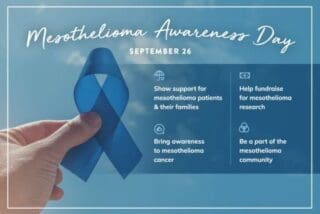
Patients face many difficult decisions after a mesothelioma diagnosis. They might find it helpful to consult a real-time database of mesothelioma and its treatment. But, no such database exists in this country. A mesothelioma registry may fill that need, giving patients and researchers access to critical data.
United States Representative John Katko (R-NY) sponsored a bipartisan bill to create a mesothelioma registry. He believes the national registry may improve care and lead to a cure for mesothelioma. If the bill passes, the U.S. would join several other countries, such as Australia and Italy, that already have registries.
National Mesothelioma Registry Could Improve Upon Existing Cancer Database
The mesothelioma community needs current data and information about the disease. The existing cancer registry system in the U.S. falls short for several reasons. First, it takes too long for the data to become available.
Before data joins the United States Cancer Statistics database, it is:
- Entered into a local registry and verified
- Sent to the state registry, where a registrar verifies and compiles the data
- Transferred to the Centers for Disease Control and Prevention (CDC) or the National Cancer Institute (NCI)
- Verified and compiled into the database
This process can take months or years. However, some mesothelioma patients do not have months or years to make treatment decisions. The reporting delay means patients and doctors may have to make decisions based on outdated information. Plus, patients or doctors may not find the limited information collected useful.
Overall, the current database provides little impact for mesothelioma patients. Yet, a well-executed national registry could act as a clearing house for critical data. It could give patients and doctors access to important information. That information might help improve outcomes, such as life expectancy, for mesothelioma patients.
Health Authorities Have Already Investigated a Mesothelioma Registry
In 2019, the CDC investigated whether a mesothelioma registry would work. The organization requested public input while weighing the feasibility of the new registry.
The goal of the proposed registry is to speed up data collection. It also aims to boost clinical research and improve patient care. It would include the number of newly diagnosed cancers and the mortality rate. This information would help policy makers understand cancer’s effect on the country.
It is unclear if any relationship exists between the CDC’s prior investigation and Congressman Katko’s proposed registry.
National Mesothelioma Registry Fate Still Unknown
The idea for a national mesothelioma registry isn’t new. In fact, Congressman Katko first proposed the bill in 2015 after meeting Meg Meccariello. Meccariello’s father, Charles Lawyer, and sister, Mary Joe Spano, died from mesothelioma. Meccariello, herself, lost her battle with mesothelioma in 2015. But, her advocacy for the registry compelled Congressman Katko to act.
The bill’s status is currently unknown. It has been referred to the U.S. House Energy and Commerce Committee. Because of Congressman Katko’s dedication to and advocacy of Meccariello and others, there is still hope it will become law.
Advocacy can make a difference in passing laws that help mesothelioma patients. Individuals interested in supporting mesothelioma efforts, including the registry, can work with existing advocacy organizations. For example, anyone can contact the Mesothelioma Applied Research Foundation to see how they can help.




